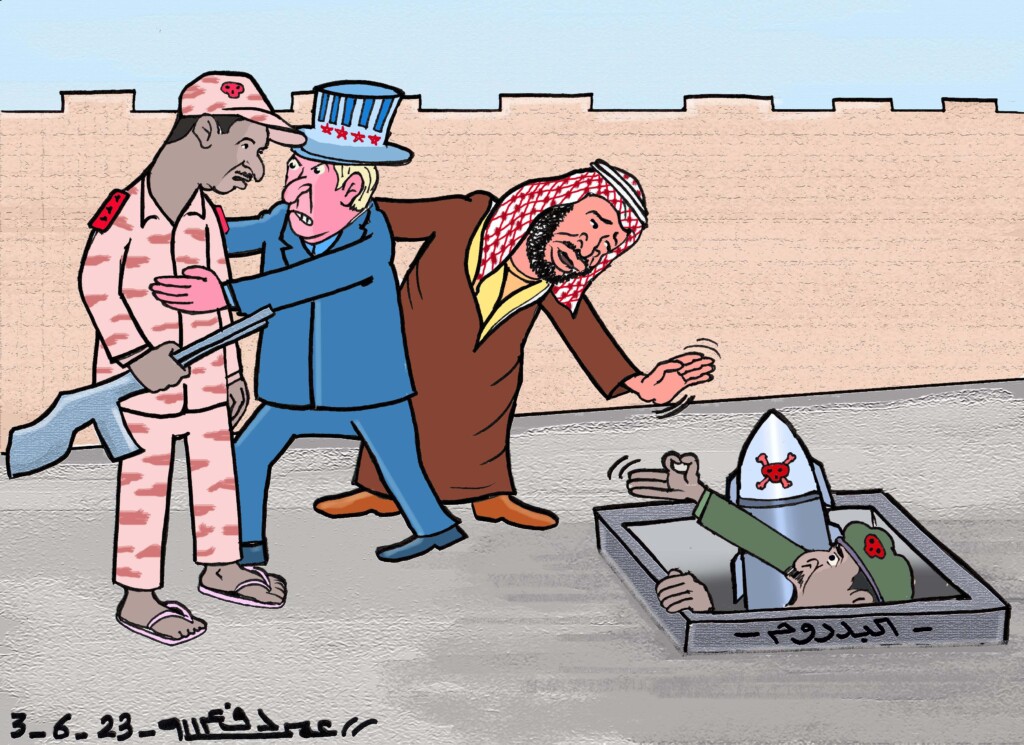SAF and RSF to resume US-Saudi peace talks

USA and Saudi Arabia in Sudan negotiations - Cartoon by Omar Dafallah, June 2023 (RD)
Delegations from both the SAF and RSF arrived in Saudi Arabia’s city of Jeddah today, in preparation for the resumption of negotiations. This development received a warm welcome across various political and civil sectors and stakeholders.
The General Command of the Sudan Armed Forces (SAF) announced its agreement to reinitiate the negotiating process with the paramilitary Rapid Support Forces (RSF) in response to a “generous invitation” from the two mediating countries, the Kingdom of Saudi Arabia, and the United States of America, operating within the Jeddah platform.
In a statement yesterday, the SAF spokesperson emphasised that resuming negotiations does not signify a halt in what he described as “the battle for dignity”. “The SAF’s primary objective in these negotiations is to fully implement the Jeddah Declaration, thereby facilitating humanitarian efforts and the return of civilians to normal life in the cities.”
“We are optimistic that the RSF will honour the agreements previously reached,” the SAF spokesperson remarked, underlining the SAF’s commitment to restoring peace and security by eliminating the “rebels” to “guide the country towards the right path”.
The Rapid Support Forces (RSF) asserted their commitment to “heeding the request of Saudi Arabia and the United States to reinitiate diplomatic talks aimed at ending the war”.
“Today signifies a significant moment in this conflict as the RSF delegation has arrived in Jeddah, hopeful that their counterparts from SAF will approach the negotiations with sincerity, pragmatism, and a genuine desire to reach a substantive resolution to cease hostilities”, the RSF said a statement yesterday,.
The RSF insists that the SAF and its former regime allies “must not be allowed to impose conditions during these negotiations or deceive the public regarding their commitment to maintaining security and stability”.
Sudanese response
Malik Agar, vice president of the Sovereignty Council and leader of the Sudan People’s Liberation Movement North faction (SPLM-N Agar) commented that peace should be sought through diplomacy rather than military options.
“If the government was pushed to adopt the military solution option, it would be costly, take time, and require human and material resources,” he said during a meeting in Juba, capital of South Sudan. The most effective solution is to reach peace through a strong will “based on wisdom and for our people to avoid the scourge of wars and their repercussions on human security”.
Agar outlined a four-stage government plan, which includes “separating the warring forces, humanitarian operations, resolving immediate war-related issues and merging the RSF into one army, and drafting a permanent Sudanese constitution”.
Kamal Boulad, a leader within the Arab Socialist Ba’ath party and the mainstream Forces for Freedom and Change (FFC-CC), expressed his welcome for the resumption of negotiations as a crucial step toward ending the war and returning Sudan to normalcy. He voiced hope for the expansion of the negotiation platform to include regional stakeholders and Sudanese civil forces.
Shehab Ibrahim, leader of the Sudanese National Alliance and FFC-CC spokesperson, emphasised the importance of adherence to the Declaration of Principles signed in Jeddah to stop the war and establish humanitarian pathways.











 and then
and then